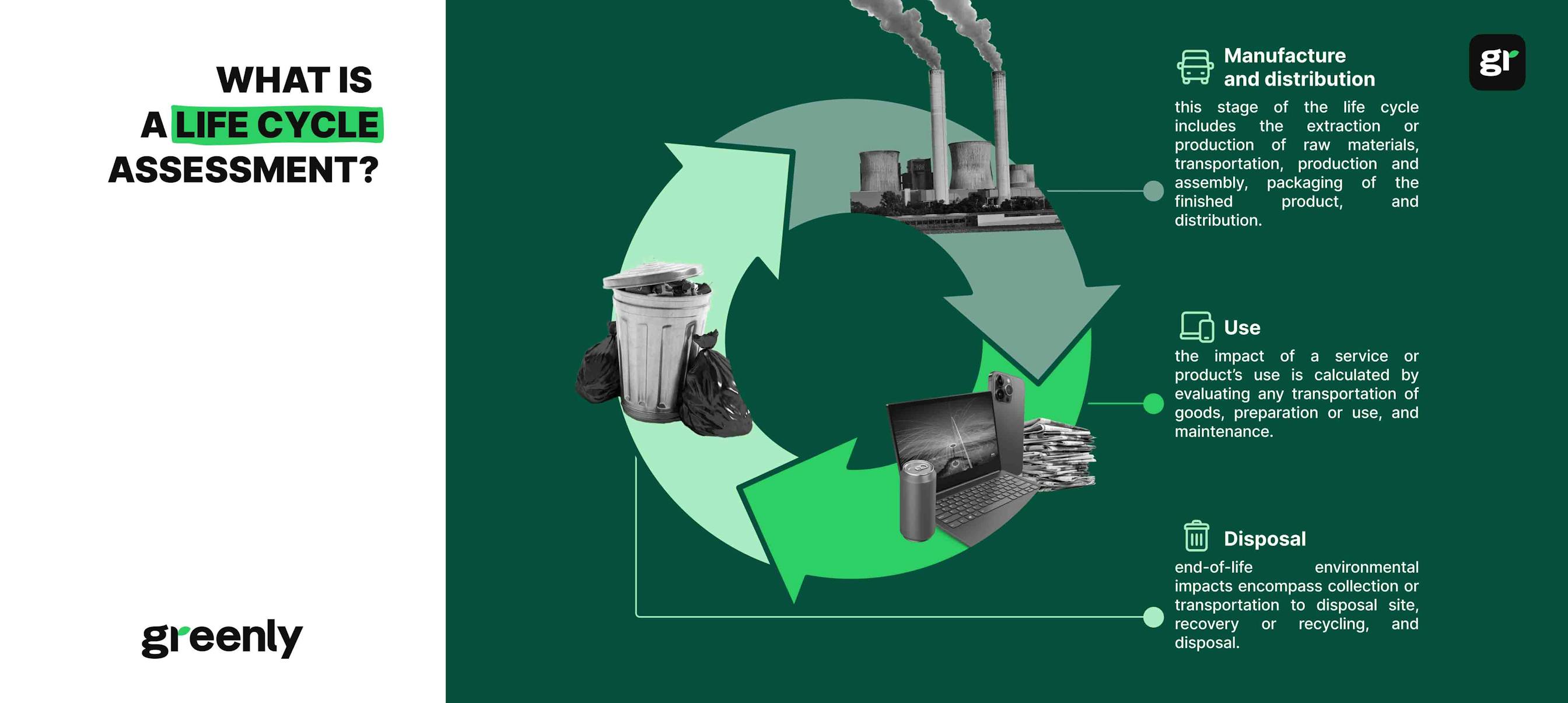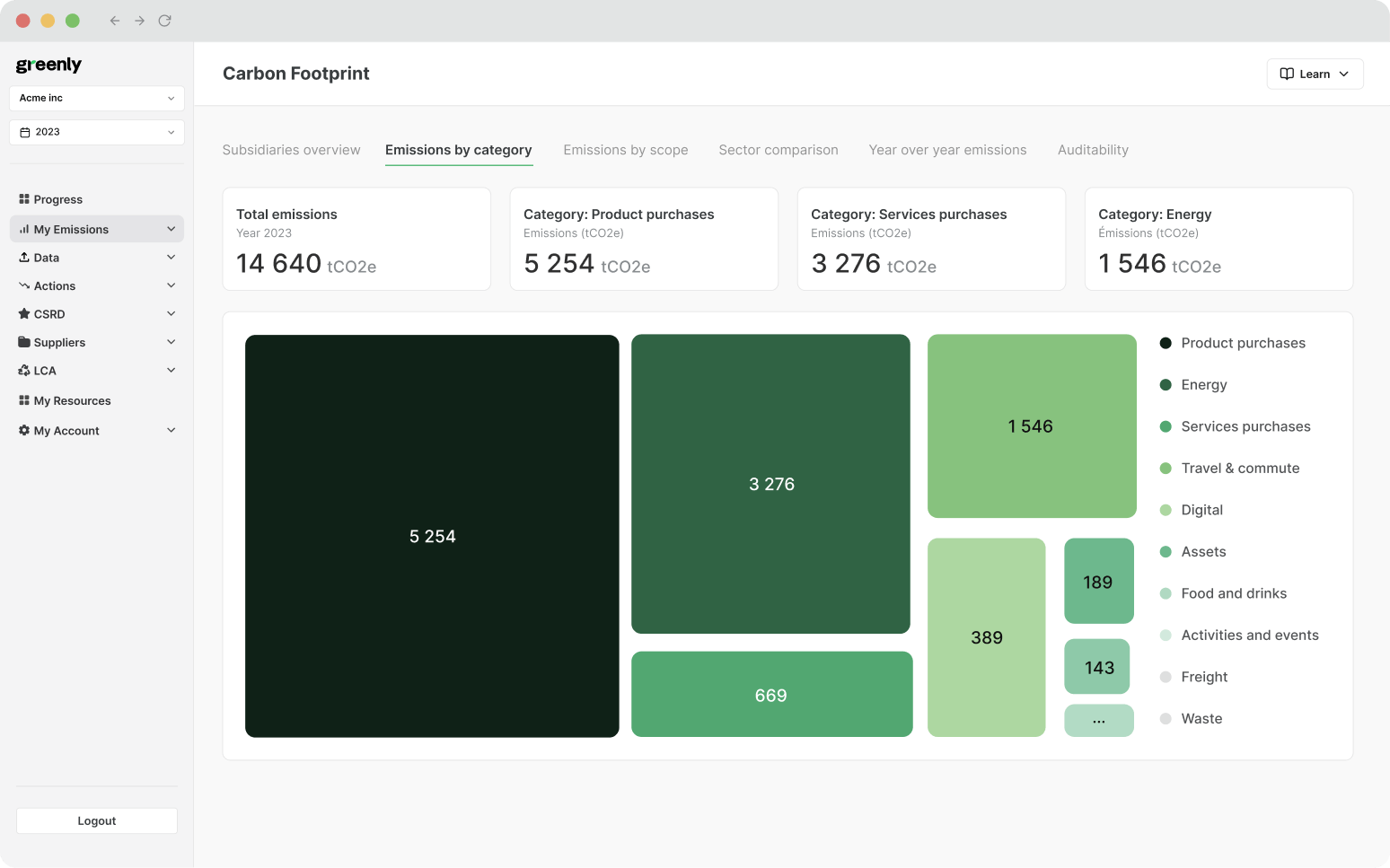Design and development
Conceiving, developing, and designing the product/service.
ESG / CSR
Industries



Behind every product - from your smartphone to your car to the laptop you use at work - lies a complex chain of materials, resources, and emissions. Understanding and measuring the life cycle of these products is vital if we're going to reduce emissions and design more sustainable products. This is where LCAs come in.
A Life Cycle Assessment is your go-to method for understanding and measuring the environmental impact of your company's product or service. It's a methodical process that helps quantify the environmental impact of your products at every stage of their life cycle - from cradle to grave.
What a Life Cycle Assessment (LCA) is
The key steps in conducting an LCA
The main types of LCAs
Why LCAs matter for ESG and CSR
The challenges and benefits
How Greenly can help
A Life Cycle Assessment, also known as an LCA, Life Cycle Analysis, or a Life Cycle Impact Assessment, is a complete measurement of a particular product or service's environmental impact, across its entire life cycle (this is sometimes referred to as cradle-to-grave, but we'll get into that later). Although you can apply Life Cycle Assessments to services, it's typically used in the realm of products and manufacturing, so we'll refer to LCAs in this context throughout this article.
Admittedly, it's a little bit odd to hear the term life applied to a non-living thing!
However, the life cycle of a product or a service refers to all the interconnected stages it goes through from conception or creation to its final disposal. This spans from the extraction of natural resources required to make it, to the release of toxins and materials into the environment when it is eventually discarded.
The life cycle of an average product or service will typically include the following stages:
Conceiving, developing, and designing the product/service.
Acquiring raw materials and resources.
Manufacturing or implementing the product or service.
Shipping or delivering the product to users.
How the product is used and the resources consumed during its lifetime.
Recycling, reuse, disposal, or repurposing when the product is finished.
A Life Cycle Assessment looks at each of these stages to identify and quantify the environmental impact associated with a product or service. This includes examining factors like energy usage, carbon emissions, waste production, etc.
As we've already touched on, a Life Cycle Assessment is a way to measure the environmental impact of a product or service.
It looks at all stages of a product's journey - from the resources used to make it, the manufacturing process, distribution, its use, and even disposal at the end of its life.
To ensure consistency across LCAs, the International Organization for Standardization (ISO) has standardised Life Cycle Assessments via the ISO 14040 series. This series provides a globally recognised framework for gauging how the lifecycle of a product or service influences a wide range of environmental factors.
These indicators can be categorised into:
ISO 14040/14044 set the framework for LCAs. The exact impact categories depend on the LCIA method — many roll detailed indicators up into three high-level damage areas.
The standardised ISO framework provides a consistent way to compare products or services and makes it easier to answer questions like which product has the least environmental impact or which is the least harmful to human health.


To better understand how an LCA works in practice, let's take a familiar example: a laptop.
Now, imagine that you're a laptop manufacturer and that you're conducting an LCA that looks at the full journey of the product - from the extraction of raw materials to the moment it's thrown out or recycled. Here's what this might involve:
Identifying components like gold, copper, and aluminium – and understanding how mining and refining these materials contribute to emissions and resource depletion.
Measuring the energy used, waste produced, and emissions released during production to pinpoint where efficiency improvements could be made.
Assessing the impact of packaging choices, such as switching from plastic to recycled cardboard or reducing unnecessary wrapping.
Calculating transport emissions, which can vary significantly depending on whether products are shipped by air, sea, or road.
Estimating electricity consumption during the laptop’s lifetime – often one of the biggest contributors to its overall footprint.
Analysing what happens when the laptop is no longer used – can components be recycled, repurposed, or repaired instead of going to landfill?
By assessing every stage of the laptop's lifecycle, we're able to get a comprehensive overview of its environmental footprint - from cradle to grave.
Armed with this knowledge, the company can then identify areas for improvement and implement strategies to improve the laptop's sustainability.
Not only is this good news for the environment, but it can also result in cost savings, improve the company's public image, and attract consumers (who are increasingly interested in sustainable products).
There are three main types of Life Cycle Assessments, each offering a different level of depth. The right choice depends on how you plan to use the results.
For example, if you’re just carrying out an LCA to understand your product’s impact internally, a simpler approach might be enough. But if you need the results for external reporting, marketing, or compliance, you’ll likely need a more detailed and data-rich analysis.
The three types of LCAs are:
(Life Cycle Thinking)
Conceptual LCAs are the most basic form of assessment. They provide a broad, preliminary look at a product or service’s environmental impact using limited data.
Results are typically shown as short statements or simple visuals that highlight which materials or processes contribute most to the product’s impact.
Ideal for early-stage design teams or stakeholders who need a quick, high-level understanding of environmental impacts without diving into complex data.
This version goes a step further by using generic data and standardised modules to estimate environmental impacts across key stages of a product or service’s life cycle.
Findings are based on semi-quantitative data from pre-existing databases and industry averages, offering a more refined picture than a conceptual LCA.
Useful for companies seeking a balanced approach - detailed enough to inform early sustainability strategies, but not as resource-intensive as a full analysis.
The most comprehensive approach, involving tailored data collection and a deep dive into every stage of the product or service life cycle.
Includes custom datasets, in-depth impact categorisation, and a detailed interpretation of results aligned with ISO 14040 and 14044 standards.
Best suited for external reporting, regulatory compliance, or product comparisons where accuracy and transparency are essential.
It's also worth noting that the focus of LCAs can vary based on your objectives. A Social LCA, for example, quantifies the social impact of a product, considering factors like labor conditions and community development. On the other hand, an Environmental LCA specifically evaluates a product's environmental impact, focusing on elements such as energy use and waste generation.
Life Cycle Assessments (LCAs) follow a globally recognised framework, developed by the International Organization for Standardization (ISO) - specifically the ISO 14040 and ISO 14044 standards.
These standards provide a clear and consistent framework for conducting LCAs, making it easier to deliver transparent, verifiable data about a company's environmental footprint.
This unified approach means that results can easily be shared and compared across different companies and countries.
Together with related European frameworks, these ISO standards set the rules for how LCAs are carried out and reported. In the table below, we have summarised the key standards you need to know and what they cover:
| Standard | Description | Key Features | Application |
|---|---|---|---|
|
ISO 14040
|
Environmental management - Life cycle assessment - Principles and framework | Defines the principles and framework for LCA, including the goal and scope definition, inventory analysis, impact assessment, and interpretation. | Applicable to all types of products and services, providing a generic framework for LCAs. |
|
ISO 14044
|
Environmental management - Life cycle assessment - Requirements and guidelines | Provides detailed requirements and guidelines for conducting an LCA, including specific steps for each phase of the LCA. | Ensures consistency and reliability in LCA processes across different organisations. |
|
ISO 14025
|
Environmental labels and declarations - Type III environmental declarations - Principles and procedures | Specifies requirements for environmental product declarations (EPDs), which provide quantified environmental data for products. | Used for creating Type III EPDs, which are based on LCA data and are used for product comparisons. |
|
ISO 14067
|
Greenhouse gases - Carbon footprint of products - Requirements and guidelines for quantification | Focuses on the quantification and reporting of the carbon footprint of products (CFP) based on LCA. | Helps organisations measure and communicate the carbon footprint of their products. |
|
Product Environmental Footprint (PEF)
|
European Union initiative for measuring environmental performance | Provides a method for assessing the environmental performance of products using a life cycle approach. | Developed by the European Commission to harmonise environmental footprint methodologies. |
|
Organisational Environmental Footprint (OEF)
|
European Union initiative for measuring environmental performance at the organisational level | Similar to PEF but focuses on the environmental footprint of entire organisations. | Helps organisations assess and improve their overall environmental performance. |
When it comes to understanding your product's impact on the environment, there are a few alternatives to the full LCA. These include:
This approach assesses the product's impact from production until it leaves the factory gates.
A mini-LCA focusing on a single process in your production chain, providing insights into specific areas of your product's life cycle.
A concept rooted in the circular economy, this method emphasises recycling waste to become new raw materials for other products or industries.
Tailored to fuels, this LCA covers the life cycle from raw extraction to emissions during usage.
Standardised (ISO 14025) and independently verified certifications that measure a product's environmental impact - often used to compare the impact of products in a similar category.
Evaluate the potential environmental impact of proposed construction projects.
Uses averages to estimate materials, energy, and emissions within specific sectors of the economy.
These methods can provide useful insights, but it should be noted that none are as detailed or accurate as a Life Cycle Assessment.
The International Organization for Standardization - through ISO 14040 and 14044 - outlines four key stages of a Life Cycle Assessment:
Each phase of the Life Cycle Assessment builds on the previous one, helping you move from defining goals all the way through to interpreting the results.
The process isn't fixed - you're able to refine and revisit earlier steps as new information becomes available, making it easier to spot where improvements can be made.
Let's explore the stages in more detail:
Every Life Cycle Assessment starts with a clear purpose. Why are you doing it? Is it to reduce your environmental footprint, meet a reporting requirement, or guide product design?
This first stage is all about setting your objectives and deciding how detailed your assessment needs to be. It’s essentially the planning phase — defining what you’ll measure, how deep you’ll go, and where you’ll draw the line.
To set boundaries, ask yourself: How much of the product will I examine? Which impacts matter most? What areas will I exclude?
Here’s where the data work begins. This stage looks at all the environmental inputs and outputs tied to your product — often called its material flows.
Inputs include things like raw materials and energy; outputs might be waste or pollutants. Together, they help you understand what your product takes from — and returns to — the environment.
Gathering this data can take time and may involve a mix of primary research, supplier data, and industry databases. Even with best efforts, you might need to rely on some estimates to fill the gaps.
Now it’s time to turn your data into insight. This stage analyses the results from your inventory to understand their real-world impact.
You might focus on carbon emissions, water usage, or other environmental factors — grouping them into categories such as climate change, resource use, or human health. The goal is to identify which areas contribute the most to your footprint, and where improvements will have the biggest effect.
This final step is about making sense of your findings. You’ll validate the results from your impact assessment, check for consistency, and identify the most significant issues.
The outcome should be clear conclusions and practical recommendations — whether that means redesigning a product, switching suppliers, or informing future sustainability goals.
In other words, this is where data becomes action.
Assessing the impact of your products through a Life Cycle Assessment is one of the most trusted ways to measure and disclose the environmental impact of your company and your products. Life Cycle Assessments are unique because they are so rigorous and are firmly grounded in data. Other systems for measuring the impact of your products do exist, but none are as quantitative or comprehensive as a Life Cycle Assessment.
See the full picture across a product’s life: materials, energy, emissions and waste. Spot the hotspots fast.
Map Scope 3, compare suppliers, and engage them with data to reduce upstream emissions.
Switch materials, rethink processes and cut energy use - lower impact often means lower costs.
Align with ISO 14040/14044, support EPDs and PEF/OEF, feed robust factors into GHG reports, and stay ready as rules tighten.
Design for repair, reuse and recycling; plan take-back models and keep products out of landfill.
Give leadership clear priorities and evidence to set realistic targets and policies.
Use standardised methods to compare models and materials - and benchmark against the market.
Back claims with verifiable data to win tenders, meet buyer requirements and avoid greenwashing.
Purpose attracts talent. Showing real progress on product impact boosts pride and retention.
LCAs are a great tool for any company that wants to understand and reduce its environmental impact. They offer insights into where emissions come from, how resources and being used, and where improvements can have the most impact. But carrying out an LCA isn't always straightforward...
From data gaps to difficulties in defining the scope, there are plenty of challenges that you're likely to encounter on your LCA journey.
In this section, we cover some of the most common obstacles encountered and our top tips on how to overcome them.
Without clear goals, an LCA can become unfocused and unmanageable. Precise objectives shape the scope, data needs and method.
Start with purpose: Are you aiming to cut impact, meet regulations, or improve design? Write it down and use it to guide every decision.
Too broad becomes overwhelming; too narrow misses key impacts.
Define what’s in and out from the start. Focus on stages and impact categories most relevant to your goals.
Accurate, complete data is hard to gather; gaps and inconsistencies reduce reliability.
Plan early. Combine primary data with trusted databases, engage suppliers, and use flow models to organise and fill gaps.
Too simple lacks insight; too detailed eats time and resources.
Match effort to purpose: simplified for screening and internal use; detailed for external reporting or compliance.
Turning inventory data into impacts is complex; different methods can yield different results.
Choose categories and methods aligned to your goals. Lean on ISO 14040/14044 for consistency and comparability.
Insights can be unclear without checks, context and prioritisation.
Run completeness, consistency and sensitivity checks. Highlight significant issues and translate them into decisions.
Measuring alone doesn’t change outcomes.
Use findings to set targets, switch materials or suppliers, and track progress. Share responsibilities across teams.
While LCAs aren’t legally required for all sectors, they’re increasingly expected within public tenders, sustainability certifications, and corporate reporting. Many UK businesses conduct LCAs voluntarily to meet investor expectations, enhance credibility, and prepare for future regulation.
Several key standards and frameworks shape how LCAs are applied in the UK:
LCAs are most commonly used in the construction, manufacturing, and energy sectors, where lifecycle data is critical for design and material choices. They’re also increasingly applied in packaging, food, and consumer goods, as companies look to prove the sustainability of their products and supply chains.
LCA data strengthens corporate sustainability disclosures under frameworks such as Streamlined Energy and Carbon Reporting (SECR) and the UK Sustainability Disclosure Standards (SDS). It helps quantify environmental performance, making sustainability claims more credible and transparent.
We won't sugarcoat it, conducting an LCA is a complex task, particularly for first-timers. The process demands a significant commitment of time, resources, and specialised knowledge that may not be readily available within your organisation. That's where companies like Greenly come in:
